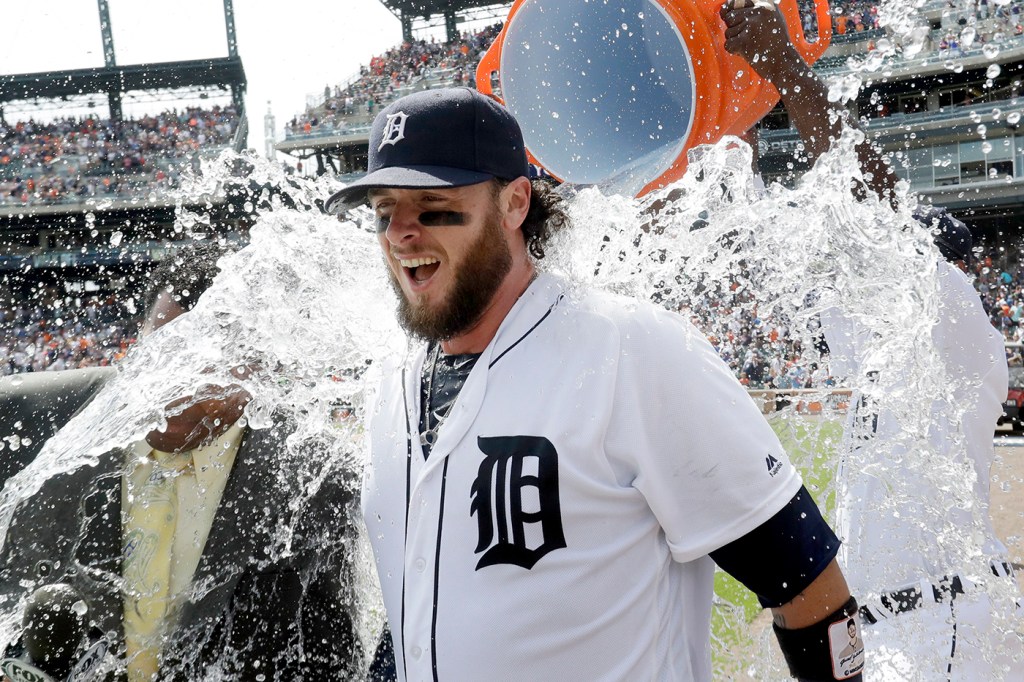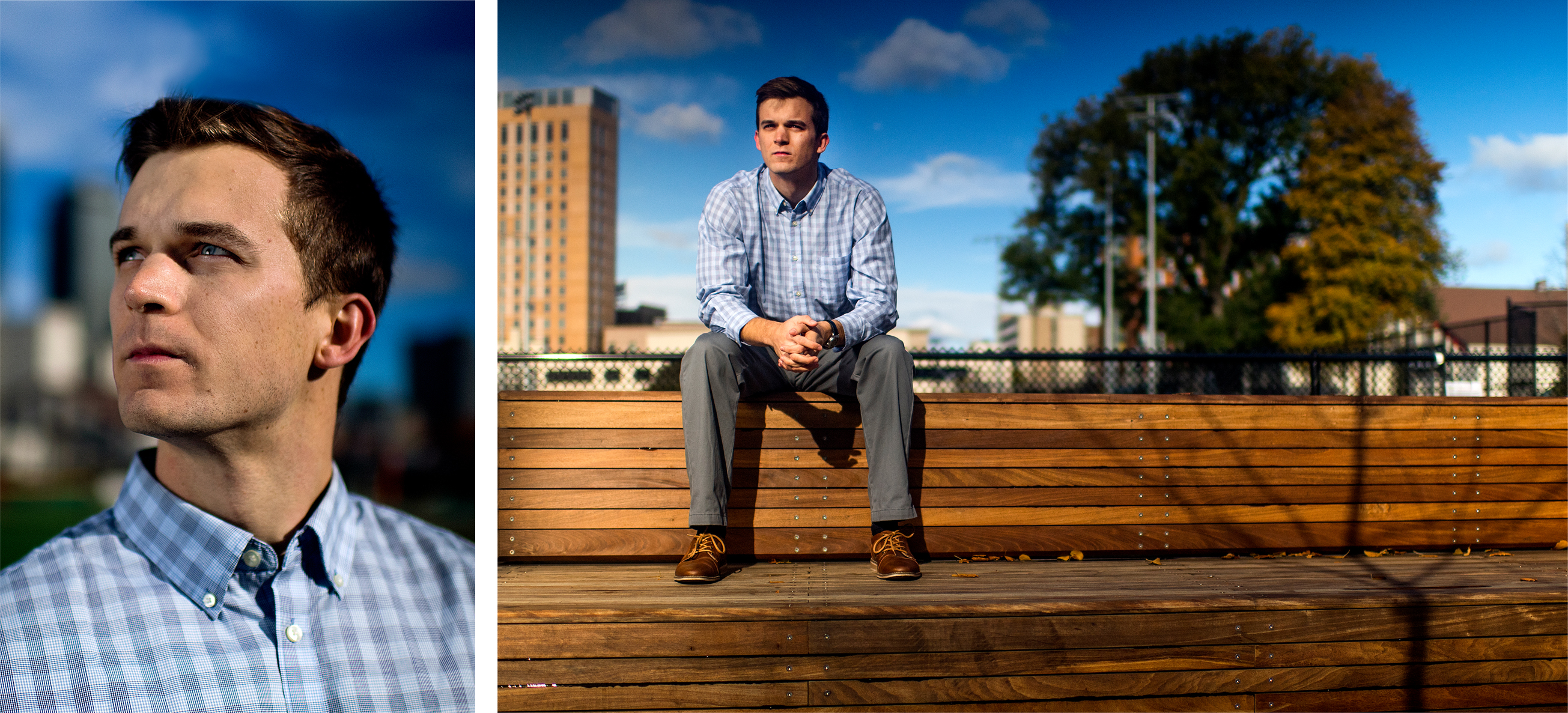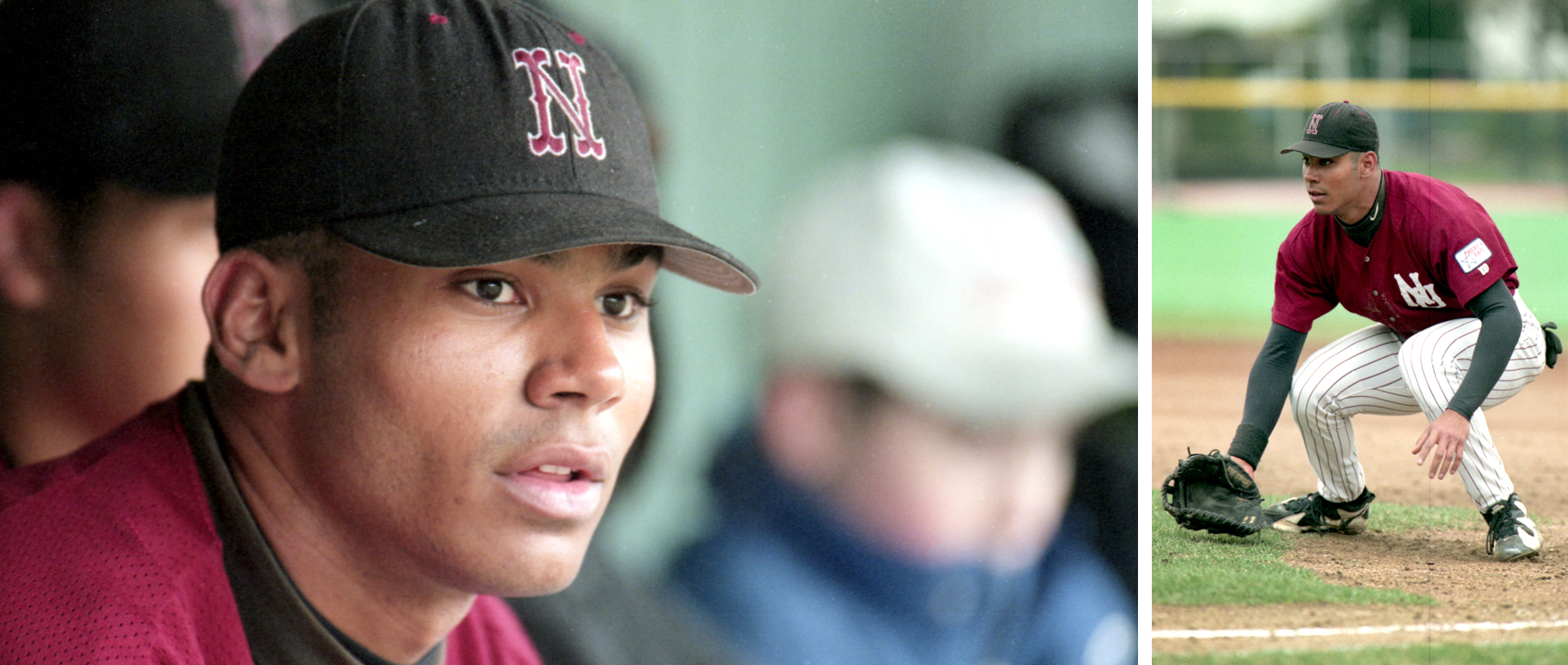Northeastern partnership with Major League Baseball helps current and former players earn university degrees

His heart sank. Walker Olis, a 23-year-old professional baseball player in the Miami Marlins’ organization, was being asked to report to management.
“I knew at that moment,” says Olis, who was an outfielder from Burlington, Washington. “It was bittersweet to be told that you failed. But at the same time, I was excited.”
The Marlins were releasing him one year after his disappointing 2017 season with the Greensboro Grasshoppers, their Class A minor-league affiliate. His batting average had slumped to .191 in 66 games on the heels of a spring-training ankle injury from which he never fully recovered.
“My heart wasn’t in it, and it kind of showed,” says Olis, in between bites of Popeye’s fried chicken in Northeastern’s Curry Student Center. His laptop and textbooks are layered inside a thick backpack on the chair beside him. The dining hall is crowded with row after row of fellow students, their conversations humming in the background, and Olis looks very much as if he belongs in their hive.
Worn down by his injury and the daily grind of pro baseball, Olis had been looking forward to exploring a new career when the Marlins handed him a promotional flyer. It detailed a program that would enable him to pursue his education at Northeastern. He was sold the instant he saw it.
“I was excited to go back to school,” Olis says.

Relieving the pressure to get a hit
“We have a tremendous amount of turnover in baseball, particularly in the minor leagues,” says Paul Mifsud, Major League Baseball’s vice president and deputy general counsel for labor relations and player programs.
MLB drafts or signs around 2,000 players annually, and the consequences are ruthless. The arrival of each rookie forces the exit of a veteran player like Walker Olis.
“So each year you have 2,000 players who now need something else,” Mifsud says.
The first-of-its-kind partnership between Northeastern and MLB is designed to help players invest in new careers after their dream of playing baseball has ended. The program enables players to work toward a bachelor’s or graduate degree at Northeastern, whether they attend classes in person or online. The university provides one-on-one access to academic and career coaching that is tailored to each student’s goals. Tuition and other costs can be covered by a continuing education program in baseball’s collective bargaining agreement.
More than 60 current or former professional ballplayers have enrolled in Northeastern-MLB partnership, which has exceeded expectations as the program enters its third year. The students include little-known minor-leaguers, as well as Jarrod Saltalamacchia, the catcher of the 2013 World Series champion Boston Red Sox, who is pursuing a bachelor’s degree in liberal studies at Northeastern.
The program is a driver of baseball’s evolving relationship with education. The conventional view of schoolwork as a distraction that hinders athletes is no longer valid, says Carlos Peña, the former Northeastern star who went on to play 14 seasons in the majors. Peña is close to graduating with a bachelor’s degree from Northeastern, with hope of earning a master’s in communications thereafter.
“When you have an education, you can play baseball with freedom, because you don’t think that everything hinges on getting a hit or making a play,” says Peña, who has been an on-air analyst for MLB Network since retiring as a player in 2014. “When you get to that point where you are playing freely, that’s when you actually play better. It’s crazy, but when you don’t feel the world is going to end if I don’t get a hit today—that’s exactly when you actually do get a hit.”
The old-fashioned demand that athletes focus on the game, to the exclusion of all else, has given way to a more enlightened point of view. MLB is aiming to help players learn how to cope with a variety of real-world issues. Education is at the center of this new push.
Fears that his career in baseball may be short-lived can be “a primary driver behind a player’s decision to use performance-enhancing drugs,” says Mifsud. “Similarly, when people are stressed about their jobs, they bring that stress home, and that leads to incidents of domestic violence.”
Education can diffuse the pressures, Mifsud says.
“We think we have the potential to reduce instances of things like performance-enhancing drug use and domestic-violence behavior,” he says, “as well as improving the performance of the players on the field who feel less stressed about their off-field prospects.”

The catcher goes back to school
Dylan Manwaring comes from a baseball family. His father, Kirt Manwaring, was a catcher for 13 years, and helped the San Francisco Giants reach the World Series in 1989.
A quarter-century later, Dylan Manwaring dropped his plans to attend Wake Forest University on a baseball scholarship in order to sign instead with the Atlanta Braves, who had picked him in the ninth round of the 2013 draft. The Braves tried to develop him as a third baseman and pitcher before letting him go in 2016 to sign with the Giants, who tried to recast him as a catcher. Just like his old man.
The Giants, in turn, released Dylan Manwaring last year. Manwaring responded by taking a full load of leadership classes online with Northeastern from his home in Jupiter, Florida. He did a co-op at MLB headquarters in New York last summer, with the hope of working his way into sports management, possibly with the front office of a team.
The son has been creating his own path, separate from that of his father, who left college after his junior year and never went back.
“And that’s his one regret,” Dylan Manwaring says of his father’s curtailed education. “He doesn’t really care if I ever play in the major leagues, as long as I’m happy doing something I love.”
Ballet dancers and ballplayers
While pursuing their long-shot dreams of an extended MLB career, players develop all kinds of important skills and habits—discipline, punctuality, focus, attention to detail, and an ability to endure public scrutiny. In baseball, an All-Star batting average of .300 means that you have failed in seven of every 10 at-bats. Every ballplayer learns how to cope with failure as well as success.
“The skills and dispositions that these athletes have to be successful are transferable to education and to being a successful student,” says Molly Dugan, an associate dean at the College of Professional Studies. “The ethos that we have around being an agile learner, being resilient and flexible, and understanding that the needs of society are changing and that we need to be positioning students for high-demand fields—I think all of this resonates with players.”
MLB’s interest in partnering with Northeastern was based in part on Northeastern’s program with the Boston Ballet, which has enabled professional dancers to pursue degrees since 2013. Additionally, The Center for the Study of Sport in Society at Northeastern has contributed to a degree completion program for college athletes since 1985.
“The ballet dancers and the baseball players all have different goals,” Dugan says. “But they all want opportunities, just like all of us do, and new learning experiences are the way to get there. We have to help them navigate the systems of higher education, which allows them to focus on the courses.”
Northeastern invested in the baseball partnership by hiring Dan Queen, a longtime business communications director with MLB, to serve as a liaison with players and the MLB commissioner’s office. Ann Cashell, assistant director of undergraduate cohort and special programs, helps to provide a “concierge” level of service to the players.
In his role as Northeastern’s strategic athletic partnerships manager, Queen also runs a similar program to provide continuing education to the MLB Players Alumni Association, which is made up of players with experience in the Major Leagues.
“It’s pretty clear that we’re getting a level of attention and service that I don’t believe any other school would be able to offer,” Mifsud says. “When a player calls Northeastern, they speak with a live person who is ready to get them started right off the bat.”
The multitasker
Walker Olis was raised in an academic-minded household. He had performed well in school without having to invest huge hours in studying. Before he was identified as a prospect in baseball, he had ideas of becoming an astrophysicist. Now he is pursuing a master’s in electrical engineering at Northeastern.
“I interned over the summer at Sandia National Laboratories in Albuquerque, New Mexico,” says Olis, two years after his baseball career ended with the Miami Marlins. “I was looking at energy-storage systems in different energy markets. I like the computational science process, which is what I’m also doing now with my thesis.”
Back in Boston, Olis is preparing his thesis (subject: eliminating leverage points with matrix stretching) while continuing his Sandia internship remotely. He has discovered that his previous life of playing high-level baseball while attending high school and college has strengthened his ability to multitask.
“The whole living-two-lives thing really helps you with time management, setting priorities, and getting things done,” Olis says. “It develops a very good work ethic. If you’re ever hiring someone and you run across an ex-student-athlete, I’d suggest you hire that person.”
Olis isn’t certain where he would like to take his new career when he graduates in the spring. Two years after the dream of playing baseball came to an end, he is beginning to realize who he can be.
For media inquiries, please contact Mike Woeste at m.woeste@northeastern.edu or 617-373-5718.






